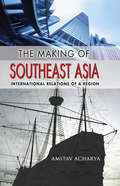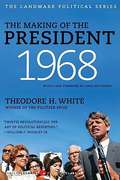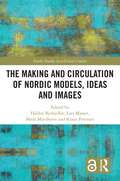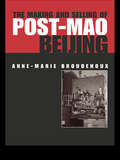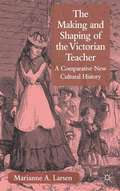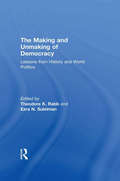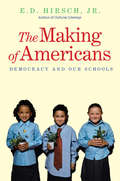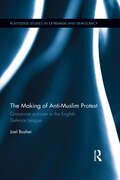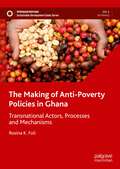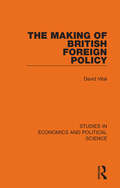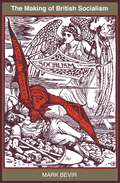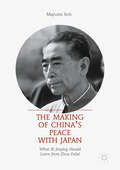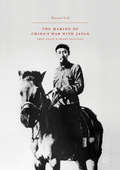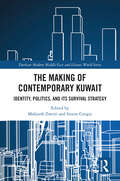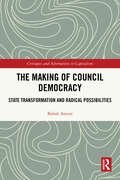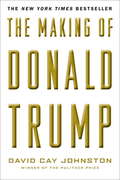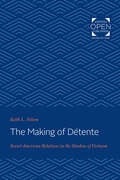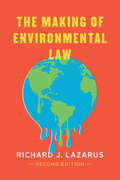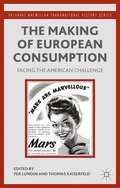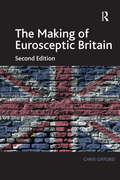- Table View
- List View
The Making Of Southeast Asia
by Amitav AcharyaDeveloping a framework to study "what makes a region," Amitav Acharya investigates the origins and evolution of Southeast Asian regionalism and international relations. He views the Association of Southeast Asian Nations (ASEAN) "from the bottom up"-as not only a U. S. -inspired ally in the Cold War struggle against communism but also an organization that reflects indigenous traditions. Although Acharya deploys the notion of "imagined community" to examine the changes, especially since the Cold War, in the significance of ASEAN dealings for a regional identity, he insists that "imagination" is itself not a neutral but rather a culturally variable concept. The regional imagination in Southeast Asia imagines a community of nations different from NAFTA or NATO, the OAU, or the European Union. In this new edition of a book first published as The Quest for Identity in 2000, Acharya updates developments in the region through the first decade of the new century: the aftermath of the financial crisis of 1997, security affairs after September 2001, the long-term impact of the 2004 tsunami, and the substantial changes wrought by the rise of China as a regional and global actor. Acharya argues in this important book for the crucial importance of regionalism in a different part of the world.
The Making Of The President 1968
by Theodore H. WhiteThe third book in Theodore H. White's landmark series, The Making of the President 1968 is the compelling account of the turbulent 1968 presidential campaign, the assassinations of Robert F. Kennedy and Martin Luther King, Jr. , and election of Richard Nixon. <P><P> White made history with his groundbreaking The Making of the President 1960, a narrative that won the Pulitzer Prize for revolutionizing the way that presidential campaigns were reported. Now, The Making of the President 1968 is back in print, freshly repackaged, and with a new foreword by Chris Matthews.
The Making and Circulation of Nordic Models, Ideas and Images (Nordic Studies in a Global Context)
by Haldor ByrkjeflotThis critical and empirically based volume examines the multiple existing Nordic models, providing analytically innovative attention to the multitude of circulating ideas, images and experiences referred to as "Nordic". It addresses related paradoxes as well as patterns of circulation, claims about the exceptionality of Nordic models, and the diffusion and impact of Nordic experiences and ideas. Providing original case studies, the book further examines how the Nordic models have been constructed, transformed and circulated in time and in space. It investigates the actors and channels that have been involved in circulating models: journalists and media, bureaucrats and policy-makers, international organizations, national politicians and institutions, scholars, public diplomats and analyses where and why models have travelled. Finally, the book shows that Nordic models, perspectives, or ideas do not always originate in the Nordic region, nor do they always develop as deliberate efforts to promote Nordic interests. This book will be of key interest to Nordic and Scandinavian studies, European studies, and more broadly to history, sociology, political science, marketing, social policy, organizational theory and public management. The Open Access version of this book, available at http://www.taylorfrancis.com, has been made available under a Creative Commons Attribution-Non Commercial-No Derivatives 4.0 license.
The Making and Selling of Post-Mao Beijing (Planning, History and Environment Series)
by Anne-Marie BroudehouxDescribes the changing life of the city and its inhabitants during the final decades of the twentieth century and examines the complex forces at play in the search for modernity. The author presents us with four case studies of how the city is marketing and selling itself (including its refurbishment for the 2008 Olympic bid) and concludes that Beijing's urban image construction may provide an avenue for opposition groups to challenge the hegemony of those in power.
The Making and Shaping of the Victorian Teacher
by Marianne A. LarsenProviding comparative and international contexts to understand the history of the making of the teacher in Victorian England, this is a compelling account of the development during this time of teacher training, inspections and certification - reforms which shaped the good teacher as a modern and moral individual.
The Making and Unmaking of Democracy: Lessons from History and World Politics
by Theodore K. Rabb Ezra N. SuleimanFirst Published in 2003. Routledge is an imprint of Taylor & Francis, an informa company.
The Making of Americans: Democracy and Our Schools
by E. D. Hirsch Jr.From the bestselling author of Cultural Literacy, a passionate and cogent argument for reforming the way we teach our children.Why, after decades of commissions, reforms, and efforts at innovation, do our schools continue to disappoint us? In this comprehensive book, educational theorist E. D. Hirsch, Jr. masterfully analyzes how American ideas about education have veered off course, what we must do to right them, and most importantly why. He argues that the core problem with American education is that educational theorists, especially in the early grades, have for the past sixty years rejected academic content in favor of &“child-centered&” and &“how-to&” learning theories that are at odds with how children really learn. The result is failing schools and widening inequality, as only children from content-rich (usually better-off) homes can take advantage of the schools&’ educational methods.Hirsch unabashedly confronts the education establishment, arguing that a content-based curriculum is essential to addressing social and economic inequality. A nationwide, specific, grade-by-grade curriculum established in the early school grades can help fulfill one of America&’s oldest and most compelling dreams: to give all children, regardless of language, religion, or origins, the opportunity to participate as equals and become competent citizens. Hirsch not only reminds us of these inspiring ideals, he offers an ambitious and specific plan for achieving them.&“Hirsch&’s case is clear and compelling. His book ought to be read by anyone interested in the education and training of the next generation of Americans.&”—Glenn C. Altschuler, The Boston Globe&“Hirsch once again challenges the prevailing &“child-centered&” philosophy, championing a return to a &“subject-centered&” approach to learning.&”—Publishers Weekly
The Making of Anti-Muslim Protest: Grassroots Activism in the English Defence League (Routledge Studies in Extremism and Democracy)
by Joel BusherActivism in any social movement group is, as Deborah Gould observes, a project of collective ‘world-making’. It is about changing the world out there by influencing policy and public opinion, but is also about the way it transforms the lives of participants – activists generate new identities, cultures, social ties, rich and varied emotional experiences and interpretations of the world around them. Movements are more likely to be able to attract and sustain support when as projects of collective world-making they feel compelling to activists and would-be activists. In this book Busher explores what has made activism in the English Defence League (EDL), an anti-Muslim protest movement that has staged demonstrations across the UK since 2009, so compelling to those who have chosen to march under its banner. Based on sixteen months of overt observation with grassroots activists, he explores how people became involved with the group; how they forged and intensified belief in the EDL cause; how they negotiated accusations that they were just another racist, far right group; and how grassroots EDL activism began to unravel during the course of 2011 but did not do so altogether. Providing a fresh insight as to how contemporary anti-minority protest movements work on the inside, this book will be of interest to students, scholars and activists working in the areas of British politics, extremism, social movements, community relations and current affairs more generally.
The Making of Anti-Poverty Policies in Ghana: Transnational Actors, Processes and Mechanisms (Sustainable Development Goals Series)
by Rosina K. FoliThis book examines the roles played by transnational actors to influence poverty reduction policies in Ghana. Whereas previous studies on anti-poverty policies have primarily focused on the ‘carrot and stick’ approach deployed by transnational actors – whereby developmental assistance is granted in return of certain conditions being met – this book demonstrates that there are several alternative strategies. Indeed, rather than adopting ‘hard’ means of shaping policy, many transnational actors in fact use a ‘soft’ approach characterized by collaboration. In order to demonstrate this, the book examines two poverty reduction programmes. Utilising research based on interviews with national policymakers, civil-society organizations and the media, it compares different approaches used by transnational actors and the attendant outcomes for national and international parties. Drawing on an interdisciplinary perspective, the book will appeal to scholars and students of public policy and international relations.
The Making of Auschwitz: The Largest Killing Factory of all time
by Ian Baxter"A chilling blueprint for genocide, The Making of Auschwitz uncovers the deadly architecture behind the largest mass murder factory in history."Commemorating 80 years since the liberation of Auschwitz-Birkenau, The Making of Auschwitz reveals the chilling construction of the largest mass murder factory in history. Drawing from hundreds of captured German documents, architectural plans, and key records from the Building Office archive, this book provides a unique historical source detailing the architectural and operational planning behind the genocide. It explores how the SS relied on civilian expertise to install crucial systems like electricity, sewage, and heating, and how external contractors eagerly participated for financial gain. From the earliest days of Birkenau's construction in 1941 to the inclusion of crematoria and gas chambers by 1943, the book traces the evolution of the camp into an industrial killing machine. Despite Himmler&’s order in 1944 to dismantle the extermination facilities, many structures remained intact when the Red Army arrived on January 27, 1945. The discovery of crucial construction blueprints, untouched by the SS&’s attempt to destroy them, offers an undeniable record of the atrocities planned and executed at Auschwitz. With rare photographs, detailed captions, and a comprehensive analysis, this book provides an essential study of those responsible for the murder of over 1 million people.
The Making of British Foreign Policy (Studies in Economics and Political Science)
by David VitalHow is foreign policy made? Who makes it? To what conscious and unconscious influences are policy-makers subject? What is distinctive about the immensely complex process as it unfolds in Britain? And what, therefore, is distinctive and characteristic about Britain’s foreign policy today? Who in Britain, has the decisive word? Why is the Foreign Office the king-pin of the system? Why does Parliament count for so little? Does public opinion count at all? Originally published in 1968, these are some of the questions which this book considers in the course of a tightly argued but very readable analysis. Some had been considered on their own elsewhere, but this study represented the first attempt by a contemporary political scientist to pull together, in brief compass, all the relevant threads – including the constitutional, the political, the institutional and the sociological. It is done, moreover, on the basis of a sharp assessment of the type of foreign policy problem that most notably confronted Britain at the time. The author has been successively journalist, official of the Israel Government, and university lecturer in politics. Throughout, his special interests and activities have been in the sphere of international affairs and it was while teaching International Relations at the University of Sussex that he wrote this book. He combines the experience of one who has seen the policy being made from the inside with the theoretical insight of the political scientist; he assesses with a sympathetic but unemotional detachment the constraints on the formation of British foreign policy.
The Making of British Socialism
by Mark BevirA compelling look at the origins of British socialismThe Making of British Socialism provides a new interpretation of the emergence of British socialism in the late nineteenth century, demonstrating that it was not a working-class movement demanding state action, but a creative campaign of political hope promoting social justice, personal transformation, and radical democracy. Mark Bevir shows that British socialists responded to the dilemmas of economics and faith against a background of diverse traditions, melding new economic theories opposed to capitalism with new theologies which argued that people were bound in divine fellowship.Bevir utilizes an impressive range of sources to illuminate a number of historical questions: Why did the British Marxists follow a Tory aristocrat who dressed in a frock coat and top hat? Did the Fabians develop a new economic theory? What was the role of Christian theology and idealist philosophy in shaping socialist ideas? He explores debates about capitalism, revolution, the simple life, sexual relations, and utopian communities. He gives detailed accounts of the Marxists, Fabians, and ethical socialists, including famous authors such as William Morris and George Bernard Shaw. And he locates these socialists among a wide cast of colorful characters, including Karl Marx, Henry Thoreau, Leo Tolstoy, and Oscar Wilde.By showing how socialism combined established traditions and new ideas in order to respond to the changing world of the late nineteenth century, The Making of British Socialism turns aside long-held assumptions about the origins of a major movement.
The Making of China’s Peace with Japan
by Mayumi ItohThis text provides a comprehensive re-examination of post-World War II Sino-Japanese relations, focusing notably on Chinese premier Zhou Enlai's foreign policy toward Japan. It juxtaposes Zhou's stance on issues which confront current bilateral relations -- such as the "history issues" and the territorial dispute over the Senkaku (or Diaoyu) Islands -- with the current Chinese foreign policy of President Xi Jinping. Through in-depth analysis of primary sources, including newly published writings and biographies of Zhou as well as newly released diplomatic archival documents, this book reveals the truth behind secret negotiations between China and Japan and sheds new light on contemporary Sino-Japanese relations.
The Making of China’s War with Japan
by Mayumi ItohThis cutting edge study examines the career of Chinese politician and diplomat Zhou Enlai (1898-1976) and assesses his leadership role in the Communist Party of China's (CPC) strategy against the Japanese invasion of China which established the foundation for post-World War II Sino-Japanese relations. It considers how Zhou dealt with Japanese imperialism during his midcareer, from the May Fourth Movement to the formation of the second United Front between the Chinese Nationalist Party (KMT) and the CPC against Japan, which paved the way for the Chinese victory in the second Sino-Japanese War. Addressing significant moments such as the Manchurian Incident and the Xi'an Incident, it provides a thought-provoking reexamination of Zhou's involvement in the May Fourth Movement of 1919, the first national grassroots movement in the modern history of China calling for anti-imperialism and nationalism, and also of his time in Europe, as essential background to understand the birth of the CPC and Zhou's role in it, as well as Zhou's collaboration with Zhang Xueliang, the culprit of the Xi'an Incident. Through an in-depth analysis of primary sources, including Zhou's own writings, the oral history of Chinese officials, and newly declassified diplomatic archives, this work presents a comprehensive and accurate account of Zhou's career against the backdrop of Japanese imperialism.
The Making of Contemporary Kuwait: Identity, Politics, and its Survival Strategy (Durham Modern Middle East and Islamic World Series)
by Mahjoob Zweiri and Sinem CengizThis book explores the contemporary history, governance, foreign policy, political economy, culture, and society of Kuwait. It highlights the dynamics of the country, putting forward both an overview of each subject covered and new research findings. It begins by providing a historical understanding of state formation and goes on to examine state structure, including the ruling monarchy, state legitimacy, and the creation of the Constitution and the National Assembly. It considers foreign policy, including the tools of diplomacy, the state’s regional and international approach, and the factors that have formed and reformed Kuwait’s strategic policy in the global arena. It assesses the economy, including rentierism, the labour market both for locals and for migrants, the class system, and the process of Kuwaitization; and it discusses Kuwaiti society and national identity, as well as investigates issues of women, civil society, youth, and the Bidoon minority. Overall, the book provides a full and detailed analysis of contemporary Kuwait and of the factors which are bringing about new developments.
The Making of Council Democracy: State Transformation and Radical Possibilities (Critiques and Alternatives to Capitalism)
by Babak Amini“Council democracy” is a particular form of democratic socialism that strives towards democratic self-governance on the basis of active, free, and associated individuals working cooperatively within a federated council system. Both in political practice and in social theory, “council democracy” has resurfaced periodically in the past, most notably in the interwar period, in the “long 1960s,” and since the turn of the 21st century. This book offers a novel theoretical and methodological approach to the study of “council democracy.” It focuses on the processes that led to the emergence of two of the foundational and most radical instances of “council democratic” movements in Germany during the German Revolution (1918-1919) and in Italy during the biennio rosso (1919-1920). With all their diversities, ambiguities, and shortcomings, these movements, in varying degrees, sought democratic alternatives to autocratic relations, from local to state levels, and to economic relations, from workplace to national levels. The book shows how the processes through which state-led war mobilization transformed the contours of class struggle laid the ground for the emergence of “council democratic” movements with specific characteristics in Germany and Italy and not in the United Kingdom and France.
The Making of Donald Trump
by David Cay Johnston<P>The culmination of nearly 30 years of reporting on Donald Trump, Pulitzer Prize-winning investigative reporter, David Cay Johnston, takes a revealingly close look at the mogul's rise to power and prominence. <P> Covering the long arc of Trump's career, Johnston tells the full story of how a boy from a quiet section of Queens, NY would become an entirely new, and complex, breed of public figure. Trump is a man of great media savvy, entrepreneurial spirit, and political clout. Yet his career has been plagued by legal troubles and mounting controversy. <P>From the origins of his family's real estate fortune, to his own too-big-to-fail business empire; from his education and early career, to his whirlwind presidential bid, The Making of Donald Trump provides the fullest picture yet of Trump's extraordinary ascendency. Love him or hate him, Trump's massive influence is undeniable, and figures as diverse as Woody Guthrie (who wrote a scathing song about Trump's father) and Red Scare prosecutor Roy Cohn, mob bosses and high rollers, as well as the average American voter, have all been pulled into his orbit. <P>Drawing on decades of interviews, financial records, court documents, and public statements, David Cay Johnston, who has covered Trump more closely than any other journalist working today, gives us the most in-depth look yet at the man who would be president. <P><b>A New York Times Bestseller</b>
The Making of Détente: Soviet-American Relations in the Shadow of Vietnam
by Keith L. NelsonOriginally published in 1995. In the early 1970s, largely as a result of the debilitating struggle in Vietnam, the United States began to reassess and redefine its basic approach to East-West relations. At the same time, the Soviet Union was awakening to the liabilities that a continuing and unregulated state of hostility would impose on its own internal and external agenda. Keith Nelson details the circumstances and traces the steps that led to the first significant accommodation and easing of tension between the superpowers during the Cold War. "In this important study, Keith Nelson explains the detente period in an imaginative, convincing, and impressively scholarly manner. Although there have been scores of books and memoirs on the subject, none have done the job quite like Nelson's. In particular, he has used post-glasnost Russian memoirs and monographs—and, especially, his own interviews with such key players as Dobrynin and Arbatov—to present one of the most intelligent Kremlinological studies I have ever seen." —Melvin Small, Wayne State University
The Making of English National Identity
by Krishan KumarWhy is English national identity so enigmatic and so elusive? Why, unlike the Scots, Welsh, Irish and most of continental Europe, do the English find it so difficult to say who they are? The Making of English National Identity, first published in 2003, is a fascinating exploration of Englishness and what it means to be English. Drawing on historical, sociological and literary theory, Krishan Kumar examines the rise of English nationalism and issues of race and ethnicity from earliest times to the present day. He argues that the long history of the English as an imperial people has, as with other imperial people like the Russians and the Austrians, developed a sense of missionary nationalism which in the interests of unity and empire has necessitated the repression of ordinary expressions of nationalism. Professor Kumar's lively and provocative approach challenges readers to reconsider their pre-conceptions about national identity and who the English really are.
The Making of Environmental Law
by Richard J. LazarusAn updated and passionate second edition of a foundational book. How did environmental law first emerge in the United States? Why has it evolved in the ways that it has? And what are the unique challenges inherent to environmental lawmaking in general and in the United States in particular? Since its first edition, The Making of Environmental Law has been foundational to our understanding of these questions. For the second edition, Richard J. Lazarus returns to his landmark book and takes stock of developments over the last two decades. Drawing on many years of experience on the frontlines of legal and policy battles, Lazarus provides a theoretical overview of the challenges that environmental protection poses for lawmaking, related to both the distinctive features of US lawmaking institutions and the spatial and temporal dimensions of ecological change. The book explains why environmental law emerged in the manner and form that it did in the 1970s and traces how it developed over sequent decades through key laws and controversies. New chapters, composing more than half of the second edition, examine a host of recent developments. These include how Congress dropped out of environmental lawmaking in the early twenty-first century; the shifting role of the judiciary; long-overdue efforts to provide environmental justice to disadvantaged communities; and the destabilization of environmental law that has resulted from the election of Presidents with dramatically clashing environmental policies. As the nation’s partisan divide has grown deeper and the challenge of climate change has dramatically raised the perceived stakes for opposing interests, environmental law is facing its greatest challenges yet. This book is essential reading for understanding where we have been and what challenges and opportunities lie ahead.
The Making of Environmental Law
by Richard J. LazarusAn updated and passionate second edition of a foundational book. How did environmental law first emerge in the United States? Why has it evolved in the ways that it has? And what are the unique challenges inherent to environmental lawmaking in general and in the United States in particular? Since its first edition, The Making of Environmental Law has been foundational to our understanding of these questions. For the second edition, Richard J. Lazarus returns to his landmark book and takes stock of developments over the last two decades. Drawing on many years of experience on the frontlines of legal and policy battles, Lazarus provides a theoretical overview of the challenges that environmental protection poses for lawmaking, related to both the distinctive features of US lawmaking institutions and the spatial and temporal dimensions of ecological change. The book explains why environmental law emerged in the manner and form that it did in the 1970s and traces how it developed over sequent decades through key laws and controversies. New chapters, composing more than half of the second edition, examine a host of recent developments. These include how Congress dropped out of environmental lawmaking in the early twenty-first century; the shifting role of the judiciary; long-overdue efforts to provide environmental justice to disadvantaged communities; and the destabilization of environmental law that has resulted from the election of Presidents with dramatically clashing environmental policies. As the nation’s partisan divide has grown deeper and the challenge of climate change has dramatically raised the perceived stakes for opposing interests, environmental law is facing its greatest challenges yet. This book is essential reading for understanding where we have been and what challenges and opportunities lie ahead.
The Making of Environmental Law
by Richard J. LazarusAn updated and passionate second edition of a foundational book. How did environmental law first emerge in the United States? Why has it evolved in the ways that it has? And what are the unique challenges inherent to environmental lawmaking in general and in the United States in particular? Since its first edition, The Making of Environmental Law has been foundational to our understanding of these questions. For the second edition, Richard J. Lazarus returns to his landmark book and takes stock of developments over the last two decades. Drawing on many years of experience on the frontlines of legal and policy battles, Lazarus provides a theoretical overview of the challenges that environmental protection poses for lawmaking, related to both the distinctive features of US lawmaking institutions and the spatial and temporal dimensions of ecological change. The book explains why environmental law emerged in the manner and form that it did in the 1970s and traces how it developed over sequent decades through key laws and controversies. New chapters, composing more than half of the second edition, examine a host of recent developments. These include how Congress dropped out of environmental lawmaking in the early twenty-first century; the shifting role of the judiciary; long-overdue efforts to provide environmental justice to disadvantaged communities; and the destabilization of environmental law that has resulted from the election of Presidents with dramatically clashing environmental policies. As the nation’s partisan divide has grown deeper and the challenge of climate change has dramatically raised the perceived stakes for opposing interests, environmental law is facing its greatest challenges yet. This book is essential reading for understanding where we have been and what challenges and opportunities lie ahead.
The Making of European Consumption
by Per Lundin Thomas KaiserfeldAmerican ideals and models feature prominently in the master narrative of post-war European consumer societies. This book demonstrates that Europeans did not appropriate a homogenous notion of America, rather post-war European consumption was a process of selective appropriation of American elements.
The Making of European Security Policy: Between Institutional Dynamics and Global Challenges (Routledge Studies in European Security and Strategy)
by Roberta N. HaarThis volume addresses how and in what capacity the European Union and its member states are able to respond to fundamental shifts occurring in global politics and remain relevant for the future. The changing nature of the international system is subject to considerable contestation among scholars, with many claiming that the fundamentals of the post-war international system are being rewritten. This volume brings together prominent scholars in the field of European security to address a range of pertinent issues related to Europe’s role in the context of evolving global challenges. The first section focuses on whether the EU is an actor with a strategic nature and the means to act on a global security strategy. The second section considers the institutional dynamics and the approaches at the EU’s disposal to fulfil its possible intended global roles. The third section addresses Europe’s most important strategic relationship—the partnership it has with the United States. This section considers the recalibration of the transatlantic relationship in light of the changing international system and the reorientation of U.S. foreign policy. This book will be of much interest to students of European Union policy, European Security policy, European Foreign policy and International Relations in general.
The Making of Eurosceptic Britain
by Chris GiffordWhat has been the political impact of the Eurozone Debt Crisis in the UK? To what extent have the bank collapses and bailouts reinforced Britain’s Eurosceptic trajectory? In this revised and updated second edition Chris Gifford addresses these key questions reflecting on the Labour government’s approach to Europe while exploring the extensive mobilisation of Eurosceptic forces in opposition to the Conservative-led coalition government. The book examines the extent to which Euroscepticism has become dominant within both the Conservative leadership and the bulk of its parliamentary party and how this has affected the relationship of the coalition government with the European Union. By placing current attitudes to Europe in relation to the wider history of Britain’s post war interaction with its continental neighbours the author shows how British Euroscepticism is structural in nature and a persistent and institutionalised feature of UK Politics.
